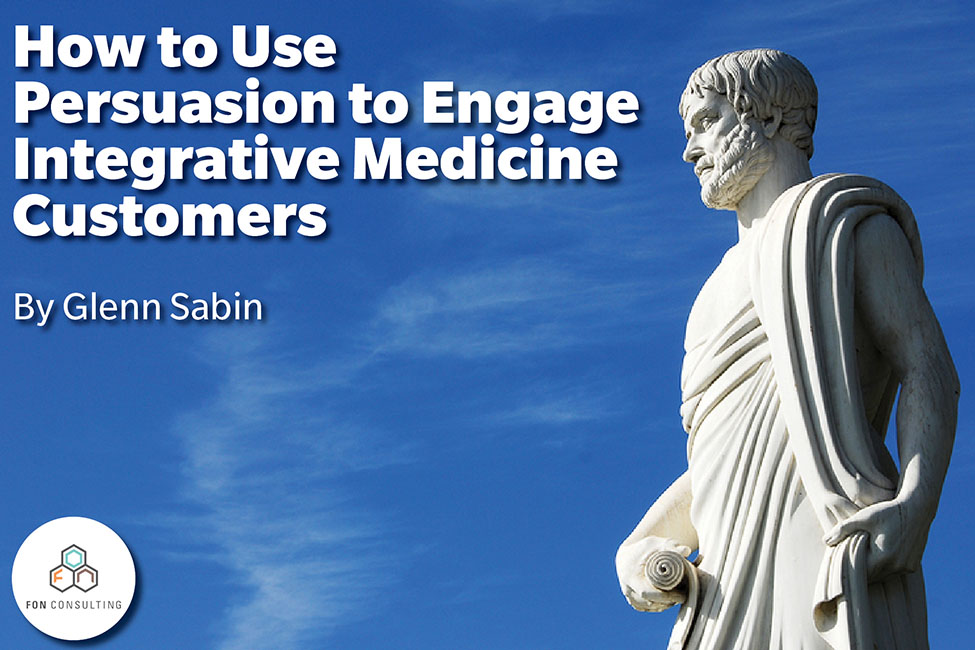How to Use Persuasion to Engage Integrative Medicine Customers
By Glenn Sabin

When it comes to persuasion, Greek philosopher Aristotle set the gold standard in 350 BCE. Aristotle’s modes of persuasion have stood the test of time, and can be applied to various aspects of your communication efforts today to best engage patients, clients, and prospects.
According to Aristotle:
Persuasion is achieved by the speaker’s personal character
when the speech is so spoken as to make us think him credible. […]
Secondly, persuasion may come through the hearers,
when the speech stirs their emotions. […]
Thirdly, persuasion is effected through the speech itself
when we have proved a truth or an apparent truth by means
of the persuasive arguments suitable to the case in question.
~Aristotle, Rhetoric, 350 BCE
Whether you are creating a talk, essay, or website content, Aristotle’s signature approach remains authentic and powerfully effective, even some 2,000 years later.
Aristotle’s rhetorical savvy focused on Ethos, Pathos, and Logos.
To further clarify: persuasion, within this realm, is linked to highly principled conduct.
Let’s examine each mode and apply it to your integrative or functional medicine practice, business, or organization.
Ethos
The ethos of your company, organization, or personal brand is characterized by:
Image
Reputation
Character
Reliability
Credibility
Ethics
And, the opportunities to apply these characteristics through the lens of integrative health and medicine present themselves when you go the extra mile.
Famed UCLA basketball coach John Wooden once said, “Be more concerned with your character than your reputation, because your character is what you really are, while your reputation is merely what others think you are.”
A wonderful quote, and so true. However, to expand, I posit that character fuels reputation.
So what’s the best way to leverage one’s reputation as an integrative medicine practitioner, investigator, or business leader?
Well, if you’re creating terrific outcomes as a physician, or delivering outstanding products or services as a business or organization, that’s easy: others will sing your praises.
Ask for testimonials—written, audio, or video recordings. Instead of placing these solely on your testimonial page, scatter them throughout your site in places like your ‘About Us’, ‘Partners’, ‘Clients’, and other strategic areas.
Also, ask your customers to post reviews of their experience on Yelp, Google, and other key ratings sites most applicable to your business sector.
If you over-deliver and engage your patients and clients in a meaningful way, they will report to others, far and wide, about your reliability, sincerity, fairness, and everything else that comprises your ethos.
Pathos
Pathos appeals to the sense of:
Emotion
Imagination
Sympathy
The opportunity to apply these characteristics through the lens of integrative health and medicine relies on establishing trust.
Enjoying this article? Subscribe and get our latest, delivered straight to your inbox.
The very best way to engage clients and prospects is to be helpful. Being helpful, over time, creates confidence around your brand.
Taking a problem/solution approach, and connecting it to an emotional impulse, is effective and influential.
In the case of health and medicine, ‘problems’ are the various conditions, hence the pathology. ‘Solutions’ are the myriad interventions within the integrative toolkit that address various morbidities, in service to health creation.
When you connect specific problems with pragmatic solutions—adding the all-too-real emotional aspect—you counter problem with solution, therefore connecting to your client. Example: pain is the problem: losing weight, by shifting to a low-inflammation diet and regular physical activity, is the solution; and anxiety, fear, or depression is the emotional connector.
Be understanding and sympathetic in your various communications, and inspirational with the real examples you provide, to trigger imagination, behavioral change, and, importantly, long-lasting transformation.
Logos
Logos appeals to the sense of:
Logic
Reasoning
Rationality
The beauty of the rise of integrative health and medicine is the growing amount of medical literature and other irrefutable data that supports the efficacy, cost-effectiveness, and intelligence of delivering root cause health resolution.
Biomedical science, done right, is compelling. Clinical experience, and actively measuring outcomes, is powerful. So, using logic, reasoning, and rationality to communicate the value of your services and products should be within your grasp—your sweet spot.
Construct well-reasoned arguments to persuade people and influence change. Do this by educating patients, clients, and prospects alike, about who you are, why you do what you do, and how exactly you can help solve their problems or make their lives easier. Cite the evidence and case reports that support your recommendations and approach.
By consistently applying ethos, pathos, and logos to all of your communications strategies and content efforts you will carry forth the Aristotle tradition of effective, persuasive consumer engagement. And, in achieving the gold standard set by ‘The Philosopher’ in his renowned modes of persuasion, your business will thrive.
About FON
FON is a leading integrative health and medicine business development and strategy consulting firm. FON specializes in custom solutions for growing patient volume, developing programs, and increasing product sales. Our practical business models are driven by innovative marketing, clear messaging, and customer engagement via branded storytelling.
Contact us today to schedule a complimentary 30-minute consultation to discuss your business development or personal brand needs.

Glenn Sabin, founder of FON and author of n of 1, is a nationally recognized thought leader who positions health innovators, enterprises, and organizations for sustainable growth. Leveraging deep experience in media, strategy, marketing, and business development—and his own compelling cancer journey—he champions personalized medicine and the generation of real-world data and evidence to help define a new, accessible standard of care.
Read Glenn’s story.




















